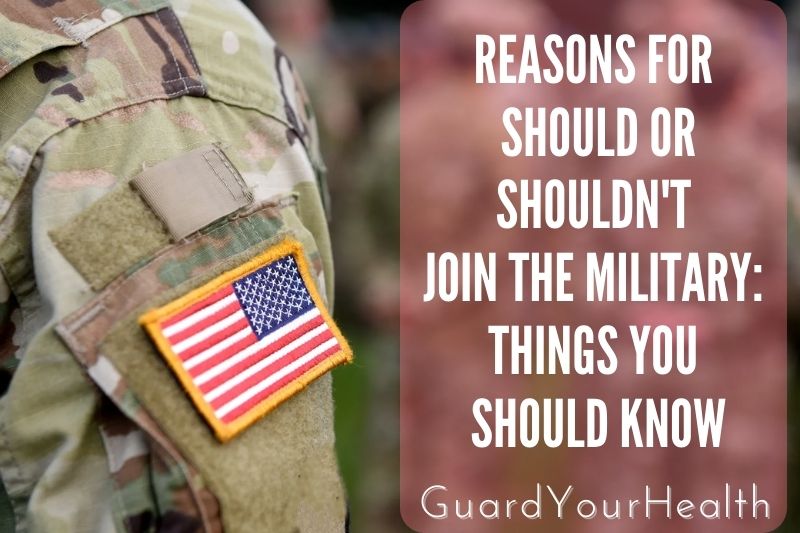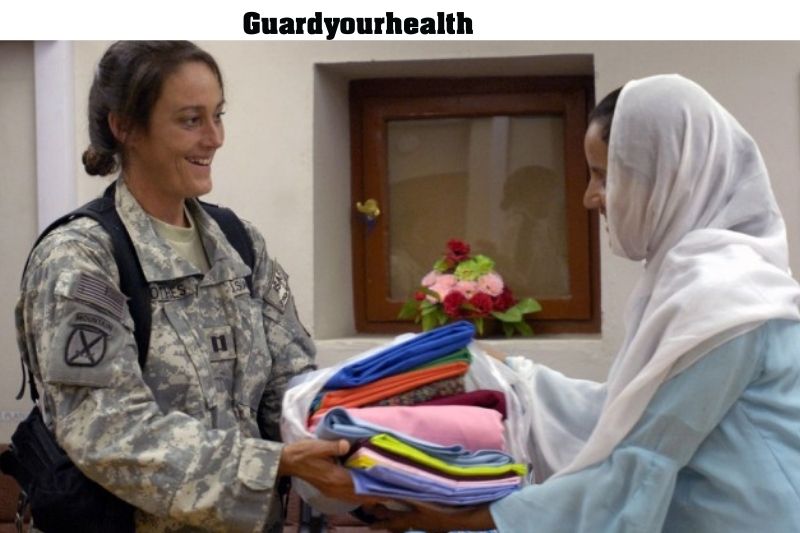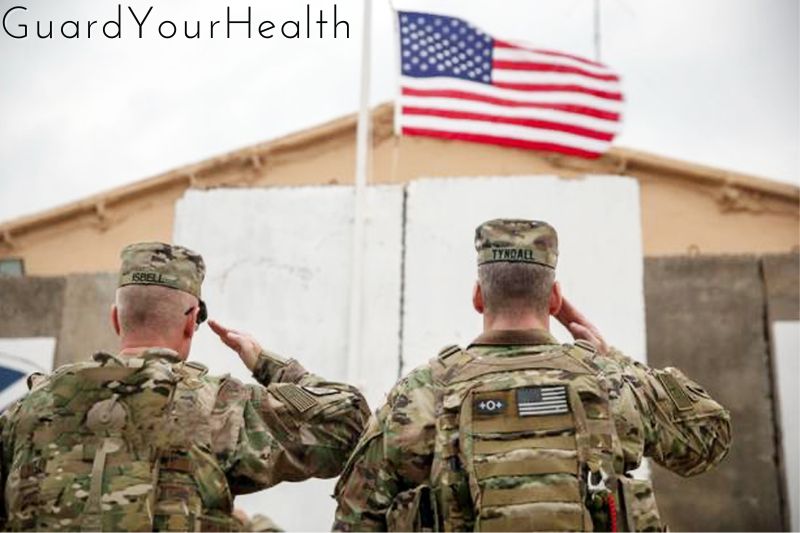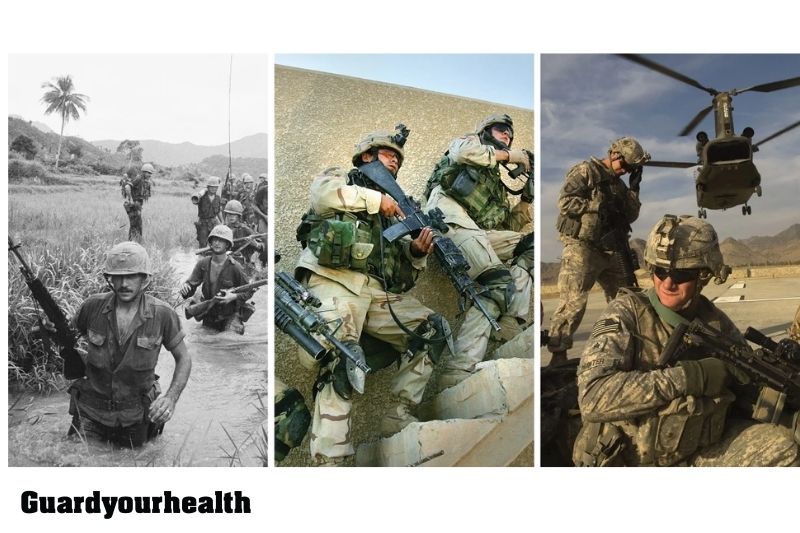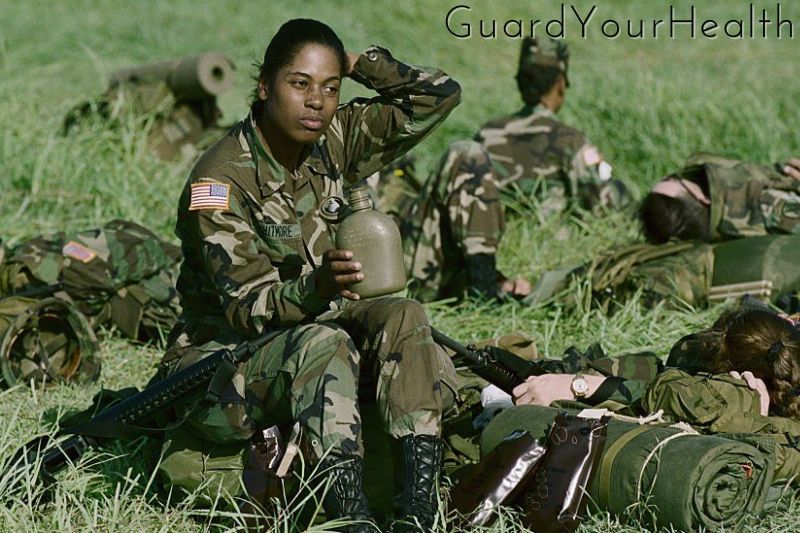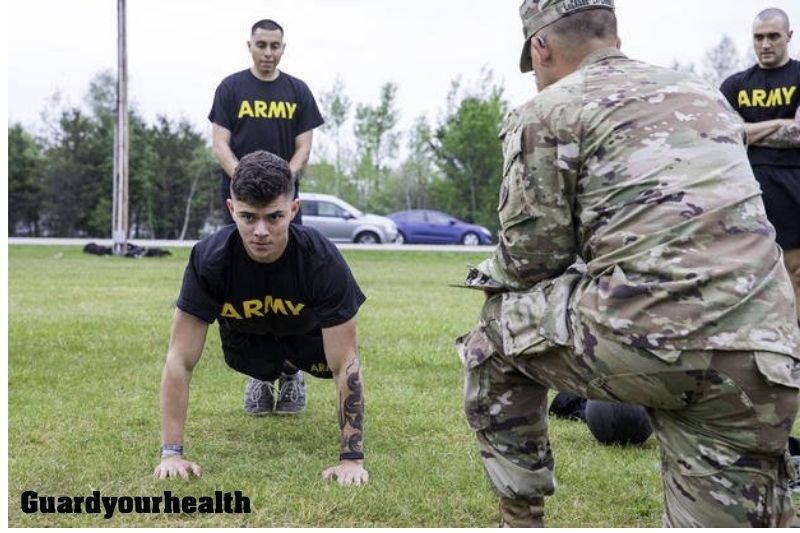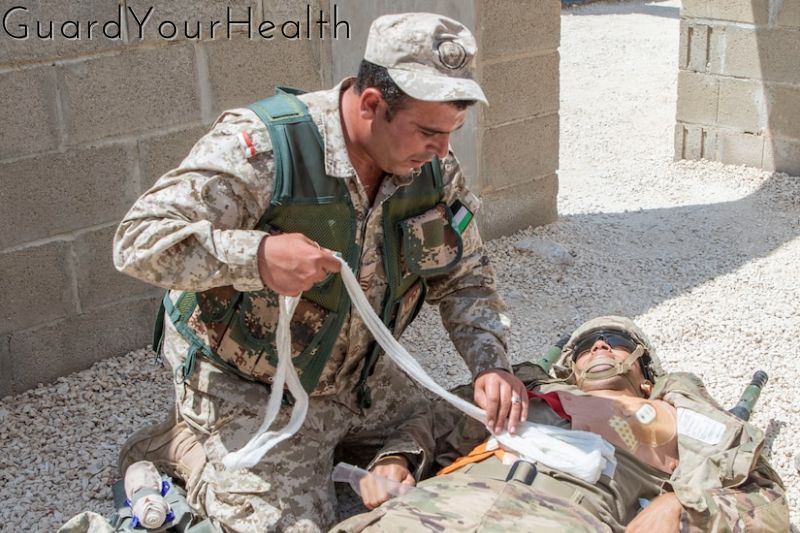There are many reasons why someone might choose to join the military, such as patriotism, a sense of duty, or adventure.
However, there are also many reasons why someone might not want to join the military, such as a aversion to violence, a desire to avoid being away from family and friends for long periods of time, or a dislike of the hierarchical structure of the military.
Ultimately, the decision of whether or not to join the military is a personal one that should be based on each individual’s own values and preferences.
Let’s be with GuardYourHealth to get more useful information through this blog post.
Why Do People Join the Military? Benefits Of Joining The Military
1. To Serve Your Country
The military is one of your greatest possibilities if you are patriotic and believe it is your obligation to serve the nation. Although it is a unique explanation, upcoming military members frequently have this rationale.
In reality, a survey poll performed in 2020 by OMK found that 17.78% of respondents said they enlisted in the military because they felt a need and/or desire to serve their country. So, if you believe that this is what led you to join the military, rest assured that you are not the only one.
2. To Uphold A Family Custom
A legitimate and surprisingly frequent justification for joining the military is to uphold a family heritage. You might be destined to join the military and serve your country. You may want to carry on a tradition started by your parents or grandparents or honor them if they served in the military. You’ll also feel proud of yourself for carrying on your family’s military tradition.
You will also benefit if a family tradition motivates you to enlist in the military. Your family members can share their experience with you and provide you with pertinent advice, both of which will help you along the way in the military.
3. To Enjoy Public Respect
It goes without saying that when you enlist, serve your country, and eventually retire as a veteran, you will gain respect from the general population. People around you will be impressed by you. Your name and position will also be associated with honor and glory. So, if this is what you desire, fighting for your nation and its citizens is a wise course of action.
4. Experiment With Yourself
Without a doubt, serving in the military is tough. You will be pushed physically, emotionally, and intellectually while serving since you will frequently be faced with demanding responsibilities that demand mental acuity and athleticism.
So, if you appreciate working up a sweat and learning from experience, you might want to seize this chance to develop yourself and stretch your current boundaries.
5. To Strengthen Yourself
The military develops its soldiers in a variety of methods. As a result, this is one of the most well-liked advantages of enlisting.
Develop your physical fitness
You will be able to enhance your physical strength and reach health goals like decreasing weight and building muscles by first undergoing rigorous basic training/boot camp and many fitness evaluations.
Additionally, because of the military’s time-constrained and strict schedule, you will have the chance to develop and maintain good routines and behaviors.
Boost your mental and emotional well-being.
Second, the mental exercise required by military service helps you become more emotionally and intellectually capable.
You will especially need to be quick on your feet and use military problem-solving and decision-making techniques. These take place frequently, in fact, nearly continuously, so it directly contributes to the improvement of your mental health.
Develop your technical skills.
Third, you will have the ability to develop technical skills, particularly marketable ones that will be very helpful after you conclude your duty and return to the workforce in the civilian sector. This is due to the wide variety of jobs available in the military.
When joining the military, you are not required to be an infantryman or a member of the combat units that engage the enemy on the battlefield. Therefore, it is quite possible for you to learn useful technical and analytical skills, as well as new ones, through serving in the military. A smart strategy to get ready is to use your military experience to gain knowledge.
Build yourself up socially
You will undoubtedly be able to develop a wide range of soft skills, including social skills. You will learn teamwork, communication, and problem-solving abilities in the military setting. You will be able to pick up a variety of useful skill sets via serving.
You will, for instance, be more adaptable, flexible, aggressive, and decisive. There are also lots of training possibilities available for you to develop your leadership skills while learning structure and discipline. When you leave the military, the civilian job market will need all of these transferrable talents.
In conclusion, think about enlisting in the military if you want to improve yourself in many ways.
6. To Have Access to Your Preferred Advanced and Specialist Training
Another justification for joining the military is this. If you wish to pursue advanced or speciality training outside of the uniformed services, it might be highly expensive and hence unattainable. Additionally, you have a say in the instruction you will receive.
You have many of chances to benefit from practical instruction that makes you an authority in your chosen subject. Therefore, you can join the military to benefit from its advanced and specialized training.
7. To Receive Bonuses and Benefits
There are several different rewards and bonuses available to military members. Possibly one of the most desired advantages of enlisting in the military is this.
Housing Benefits
Military personnel are eligible for a baseline housing allowance, an overseas housing allowance, a family separation allowance, a dislocation allowance, and a move-in housing allowance. These are grants and home loans available via the Department of Veterans Affairs.
Medical Benefits
All military personnel in all branches of the armed services, including veterans and retirees, are guaranteed medical treatment under the military health system. These medical benefits are available to family members as well.
Additionally, you will have access to special health benefits, insurances, and incentives under TRICARE services, including those for the three Prime, Extra, and Standard programs.
You can also sign up for retiree survivor benefit plans or life insurance for service members, in more detail. Additionally, you can enroll in programs run by the Veterans Health Administration for the treatment of agent orange exposure, blindness, and HIV/AIDS.
Education Benefits
You have a few educational advantages if you join the military. You are eligible to receive up to $4,500 in annual tuition assistance while serving. The Post-9/11 GI Bill, the Montgomery GI Bill for Active Duty, and other sub-educational programs are among the most notable, although the GI BILL is by far the most notable.
Regardless of whether you are enrolled in college, vocational school, an apprenticeship or other kind of work training, or licensing programs, the Post 9/11 GI Bill will cover your tuition, fees, housing stipends, and book stipends for up to 36 months of your higher education. You can also choose to give these benefits to your spouse or other family members.
Amounts up to $2,122 per month are covered for 36 months under the Montgomery GI Bill for Active Duty. It is applicable for a full-time institutional education, however eligibility is based on when you enlisted or served and how long you did so for.
Paid time off, savings on vacation and other activities, assistance for small businesses, and employment security are other benefits. Therefore, it makes sense to choose to enlist in the military for the variety of perks it provides.
- Read more: Military Pay Dates
8. To Journey and Encounter Individuals From Various Cultures
A fantastic way to travel and meet individuals from different cultures is to enlist in the military. This is due to the military’s extensive global network of foreign bases, including those in South Korea, Japan, Italy, Germany, Poland, and other countries.
There are domestic travel options to Alaska and Hawaii in addition to international destinations. Additionally, your experience will give you a wider perspective on the world. What could be better than free travel, am I right?
Reasons Why You Shouldn’t Join The Military
1. Unwilling to Relocate
If you join the military, relocations are common. Therefore, do not enroll if you know you cannot or do not want to move. The military maintains numerous overseas bases. Therefore, personnel is routinely sent to other countries.
You may have to reside away from your primary base during some missions, particularly in times of war and emergency. You might sometimes need to move to places you’ve never even heard of!
You will frequently have to transfer your home and family in addition to moving. You shouldn’t join the military if you feel that this will be too much for you to bear and adjust to.
2. Cannot Take Time Off Without Family or Loved Ones
The idea that you will spend a lot of time away from your family if you join the military is one of the main deterrents.
Those who serve in the military should expect to spend some time away from their families or other loved ones.
Extremely long workdays, such as 24-hour shifts and holiday working hours, may be the cause of this time off.
The following are additional reasons why military members are away from home:
- Field training or exercises
- Deployment
- Temporary assignment of duties
- Travel for temporary duty
- Participation in specialized training or education
- Maritime time
- Missions in special operations
Military soldiers can accumulate “leave,” or vacation days, but they must first get permission to take any time off.
This dedication to duty and absence from family and friends can be trying and demanding on marriages, parenting, friendships, and family cohesion.
As a result, you shouldn’t join the military if you can’t commit to being away from your family or other loved ones for an extended period of time.
3. You Are Unable To Stop Using A Specific Substance
The military is tough about drug use in all branches. You will need to pass a drug test before you can enlist. You will not be eligible if drugs are found in your urine sample during a urinalysis.
Additionally, the military is not for those who are unwilling to give up their habitual drug usage now that some narcotics are legal in some jurisdictions. Don’t anticipate becoming an exception. Drugs are strictly prohibited in the military.
4. You Detest Being Instructed What To Do
One of the most obvious excuses not to enlist is this. The military environment is entirely hierarchical, with clear ranks. During your time in service, you will undoubtedly get commands and be instructed on what to do. Do not join the military if you are egotistical and dislike being told what to do.
When you first join the military, you will be a small fish in a very large pond. No matter how much younger the person in charge is than you, you cannot refuse commands. In this case, there is no military justice.
Although your physical and intellectual performance may help you advance in your career, it does not grant you the right to decide whether you want to obey orders or not.
5. You Dislike Collaborating With Others
There are many people in the military, which is a large institution. Therefore, regardless of your position, teamwork is crucial. Do not apply for the military if you dislike working with others.
In almost all military vocations and positions, you must participate in cooperative and collaborative action. This fact will remain unchanged regardless of the branch you are in. You should be prepared to collaborate with others even if you are a truck driver, cook, water delivery worker, medic, etc…
You will have to collaborate with individuals from different departments of the military as a whole in addition to your direct work with one another inside a unit or group.
As an illustration, if you are a paratrooper, you will interact not only with your comrades but also with infantry, medical personnel, pilots of aircraft, etc. Basically, joining the military is unsuitable if you are unwilling to work as a team.
6. You Cannot Tolerate Bloody or Violent Situations
This deterrent to enlisting in the military cannot be made any clearer. If you’ve watched any military-themed movies, you already know that violence is integral to military life.
There is always a lingering element of violence and gore, even though your individual position will determine how much violence you are exposed to.
If you are a soldier in the infantry, you will probably have to bull-head in harsh environments more often. You’ll need to get proficient with your weaponry and possibly use it to fire at other soldiers who are still alive while fighting. Scary, huh?
However, even as an army administrator, there is a probability that you will encounter difficult situations. It is certainly not a violence-free setting if you sit in the office organizing files while the enemy makes a raid. Therefore, avoid joining the military if you find it difficult to handle violence and/or gore. Perhaps a quiet civilian job would be better.
7. You Are Unable To Cope With Having Little Personal Time
You won’t have much free time as a military person. Your day will be spent primarily in training and mission execution as you serve your nation and its citizens. Therefore, it follows that you will have little free time.
Do not anticipate lying in bed, watching Netflix, donning a face mask, and relaxing. In the military, time is a luxury. There is always work to be done! You’re fortunate to have enough time to take a shower and get dressed.
Furthermore, if you truly have free time, you might feel bad because this idea will have become so commonplace. This is another reason why it’s so challenging for new recruits to fit in at first. You frequently experience a sense of emptiness when you are unable to keep up with yourself.
The military is not for you if your personal time is valuable to you and you cannot afford to give it up.
8. You Don’t Want To Exert Yourself Mentally and Physically
Physically and mentally, serving in the military is difficult. To start, you will need to verify your competency by passing a written test and a fitness test.
As a recruit, you will also need to go through arduous basic training, commonly known as boot camp training, which establishes standards for your physical and mental prowess. The particular actions you must take for this vary on the branch of the military you are in.
For instance, to join the Marine Corps, you must have exceptional swimming ability; to join the Navy, you must pass a live fire training test. Veterans and active military personnel usually concur that the Air Force is the most difficult branch.
However, it also heavily depends on your current set of skills and talents. However, there are significant physical demands across all branches. You will be dropped if you are not physically healthy enough to serve in the military.
Additionally, there are numerous rules and guidelines that you must internalize. It is a deluge of information that can be challenging to handle and get more and more daunting with time. Do not anticipate anyone wiping your blunders under the rug because the military has a strict protocol.
Once you are a recognized military member, you will encounter challenging circumstances that require quick thinking and appropriate action.
You will undoubtedly feel a lot of pressure. Your choice and course of action could determine not just the future of your troops and other military members but also that of your entire nation. As a result, it will occasionally be cognitively and emotionally draining.
If you are a combat soldier or infantryman, you will probably see more horrific and graphic war scenes. As a result of what you witness and experience on the battlefield, you can lose a loved one, get injuries, or develop scars.
As a result, post-traumatic stress disorder and anxiety disorders are prevalent in veterans, retirees, and active duty service members. The majority of military personnel also struggle with sleep deprivation and depression.
Be prepared to take on extra duties if you decide to pursue a lengthy military career in which you serve for a lengthier period of time than is typical and advance in rank. You will most likely face additional physical and emotional challenges in this situation.
9. Expecting “At-Will” Employment
At-will employment is the foundation of the civil employment market.
This implies that an employee can be fired legally by an employer.
Additionally, there are no legal repercussions for a person quitting their employment at any moment or for no reason.
You cannot expect at-will employment in the military, unlike in the civilian world.
Members of the armed forces cannot merely leave their jobs or stop working.
They have a legal and moral obligation to carry out their agreed-upon obligations to the US government.
Of course, you are not required to reenlist or serve long after completing your commitment.
Your military branch may also release you from active duty for a number of reasons.
If it is determined that you are unable to execute your obligations due to physical or mental impairment, you could be discharged, among other things.
For whatever cause, service personnel who receive a dishonorable discharge forfeit all veteran benefits and may have difficulties while searching for jobs in the private sector.
Even worse, there might be serious repercussions for people who go AWOL (absent without leave) or desert the military.
Loss of salary and rank, dishonorable dismissal, and possibly jail time are possible consequences.
Since working in the military is not at will, anyone considering joining must be certain that they can fulfill their promise to serve.
10. Aversion to Danger or Risk
The possibility of danger is yet another deterrent to joining the military.
Even though much employment in the civilian world comes with some level of risk and danger, people who join the military face higher levels of both.
Each component of the U.S. Armed Forces has some occupational costs related to physical, psychological, and emotional health.
Veterans and their families may both attest to this.
However, because serving in the military is dangerous, there is a substantially larger chance of long-term consequences for service personnel.
This is especially valid when soldiers are deployed, engaged in battle, or exposed to other grave dangers.
Several veterans have long-term problems due to the physical and mental wounds they received while serving.
Certain disabilities may severely impact a person’s quality of life.
Relationships, physical and mental health, and the capacity to transition to a life and profession in the civilian world may all be impacted by this.
Therefore, you shouldn’t consider joining the military if you are afraid of risk or danger.
FAQs
Is it a good time to join the military?
The discussion here: https://www.quora.com/Is-now-a-bad-time-to-join-the-military
Can You Join The Military If You’ve Smoked Weed?
In the past, using controlled substances illegally, like marijuana, resulted in immediate disqualification. The military has embraced a more accepting culture toward marijuana use today. As a result, you can obtain waivers for marijuana use before enlisting.
However, this does not permit you to indulge in one last joint before reporting for duty. Waivers aren’t always possible. It is best to abstain from all drugs, including cannabis if you want to be confident that your enrollment will go through.
Regarding pre-service marijuana use, certain branches are more accepting than others. The Air Force’s cannabis policy is one example. The official webpage was amended in 2021 to reflect that marijuana use before employment is not, in and of itself, a disqualifying factor. However, substance addiction is typically a disqualifier.
Only qualified candidates with the following pre-application drug consumption levels are eligible for waivers:
Limited in scope, occurring no more than five times, and unlikely to occur again
Not involved in civil matters other than possession
Note: You will not be eligible for the Air Force if you use marijuana after the date of your interview since you are considered to be doing so while serving in the service.
Conclusion
Joining the military can bring many benefits including the opportunity to serve your country, travel the world, and earn good pay and benefits. However, there are also some disadvantages to military service, such as the risk of being deployed to a combat zone. Whether or not you should join the military is a personal decision that depends on your own circumstances and goals.
We hope that you can find it helpful in this article. Thanks for reading!

